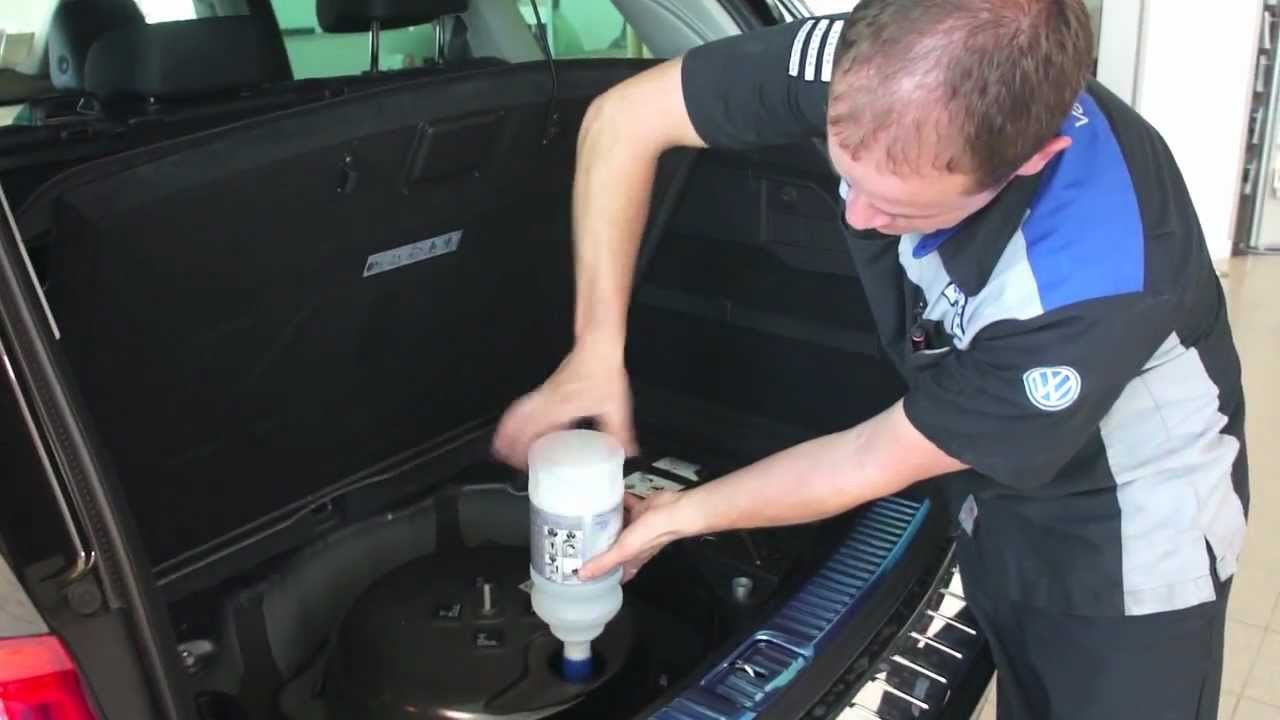
With recent regulations coming from from the Governments and the EU, pressure on vehicle manufactures to reduce the emissions of their latest vehicles get's tougher and more stringent each year. As the years have progressed the manufactures have made their engines increasingly more efficient with technology such as turbos.
Sometimes however efficiency doesn't always help or aid in the emissions from an engine, especially a diesel engine. With the latest emissions standards (Euro 6 at the time of writing), manufactures are relying on specific and radical ideas to fall in line with emissions targets, especially with regards to diesel engines.
AdBlue is a specific system known scientifically as Selective Catalytic Reduction (SCR) and is a method of injecting a urea/water into exhaust gases to combat and remove harmful pollutants. Most have heard buzzwords of Nitrogen Oxides (NOx) of which we have Nitrogen Dioxide (NO2) brought into the spotlight with the recent emissions scandals.
The urea/water mix fluid used in the majority of vehicles is known as AdBlue which is a registered trademark of the German Association of the Automobile Industry (VDA). By being registered & trademarked with the VDA ensures that quality and standards are maintained, protected and controlled going forwards.
AdBlue is injected directly into the exhaust gases where it causes a chemical reaction to combat the NOx, the final result being a less polluting mix of Nitrogen and Water being emitted from the exhaust. This is very much unlike petrol or diesel which is directly injected into the engine.
Most SCR/AdBlue equipped vehicles traditionally are the larger sized diesel vehicles such as vans, estates and SUV'S. The SCR/AdBlue systems require extra bulky equipment including a fluid tank thus meaning most smaller vehicles generally are not fitted or equipped to run it. However this is only a guide and there will always be exceptions.
Generally speaking when purchasing a car you should of been told of specific features (especially when new), or it will be detailed within the vehicles handbook. Failing that, most vehicles will have a black or blue filling cap situated in the boot or near the diesel filling cap as a giveaway that an SCR system is fitted.
If you are in any doubt at all, most garages will be able to check your AdBlue requirements using your vehicle registration number. The RAC also has a great write up on the euro ratings for vehicles which can help identify if your likely to need AdBlue.
Again, this can vary from vehicle to vehicle but a typical tank on an estate car such will be in the 12 litre area. Unlike fuel tanks, the AdBlue tank size isn't always in relation to the vehicles engine size, for example a VW Passat estate holds 13 litres, yet the VW Tiguan SUV only holds 12 litres.
The rate of consumption of AdBlue will vary depending on the driving style and use of the vehicle, for example urban driving will consume more AdBlue than high efficiency cruising on the motorway. On a typical car you can expect to see a 600 mile range on 1.5 litres of AdBlue giving the average family estate a range between 4000 to 6000 miles before topping up.
Vehicles will generally carry an indicator of how many miles (estimated) are left before AdBlue requires replacement and all vehicles will at least state when they are low on AdBlue via a message, sound or warning symbol.
You can indeed, AdBlue is available from most petrol stations, service stations and garages and comes in a variety of container sizes. It is also possible to find AdBlue in a pump similar to how you would find petrol or diesel.
For the majority of vehicles, topping up the AdBlue is as simple as opening the AdBlue pump and filling up the tank with the required amount of liquid. There may be instances where this setup doesn't work correctly and would need garage intervention.
Of course, here at Whatlington Garage we keep AdBlue and are happy to help and assist with topping up the vehicle when required, or even just checking your levels.
Most (if not all) vehicles should reset their AdBlue levels/counters once the vehicle has been filled up but occasionally these systems don't reset and require connection to a diagnostic machine to try a forced reset. Generally this does indicate there is another issue with the vehicle that will require repair. Some manufactures such as Peugeot actually recommend that AdBlue top up is done at an authorised dealer.
Just like filtration, AdBlue has specific standards it has to meet and adhere to in order to satisfy the warranty conditions. We only use AdBlue solution that meets the criteria set by VDA to ensure it meets and complies with any restrictions in place on warranties.
If your AdBlue runs out, in most cases the car will stop running or go into a safety/limp home mode. For this reason many higher milage drivers will opt to keep a small emergency bottle in their vehicle. Likewise the best advise is to top up your AdBlue as soon as a message appears it is getting low. AdBlue costs are cheap, normally around £2 per litre making it a bit easier to get refilled.
A common misconception is that AdBlue is urine which isn't completely true. The mix actually consists of Urea which is found within urine but isn't urine itself. It is however normally extracted from animal urine (namely pigs) and mixed with water.
PAT or Eolys fluid is a completely different system to AdBlue and should not be confused. AdBlue is a water based solution that is injected into the exhaust gas, where as Eolys or Pat fluid is oil based and injected and mixed in with the vehicles fuel.
If you have any AdBlue problems, or wish to have your AdBlue topped up then please give us a call, or drop us a message via our contact page